"It is very important that our supply chain is 100% aligned with our strategic plan"

AutoRevista.- What are the requirements and criteria for the approval of suppliers of the different links in the value chain in this era of transformation towards a more digital and sustainable industry?
Sergio Freitas.- Having a planned, efficient and performance-oriented supply chain is a guarantee of success. Within that value chain, companies must meet the same requirements, as they are all important for effective performance. On this basis, it is essential to demonstrate a combination of technical expertise, technological competence, resilient sustainability practices, mature quality management systems, financial stability and flexibility. All with the aim of adapting to change quickly, especially in the era of digital transformation.
It is a reality that the automotive industry is becoming increasingly digital. Companies in this value chain must have the technological capability to adapt to market demand, such as autonomous driving systems or vehicles with artificial intelligence. Change in the industry is continuous, forcing companies to be highly flexible and almost immediately responsive to demand.
In addition, the automotive industry demands strong quality management systems, so all suppliers must comply with well-defined and regulated standards, such as ISO 9001, ISO 14001 or IATF 16949. The code of conduct is mandatory and vertical to all companies within the heat chain. In addition to these regulations, sustainability plays an extremely important role today, forcing companies to introduce systems that reduce consumption or to use renewable materials. All these processes are selection criteria for suppliers. It is not an option: either they have them and carry out their activity according to these criteria and are eligible or they cannot be suppliers to the industry.
AR.- How is the relationship between customer and supplier evolving, especially in innovation, to achieve higher and better levels of partnership?
S.F.- The relationship between customer and supplier has evolved over the years, especially in the automotive industry. It is increasingly important to have a close collaborative relationship, especially with the continuous evolution of vehicles in terms of technology and innovation.
One of the trends is the use of modular architectures that allow different components to be interchanged inside and outside vehicles
One of the trends is the use of modular architectures that allow different components to be interchanged inside and outside vehicles. This is forcing a greater search for specialised suppliers with whom car manufacturers can establish cooperation agreements that set them apart from the competition. The same applies to electric or autonomous vehicles. These new technologies require a broader level of components, so customer-supplier cooperation in the development of such solutions makes a difference in the market.
As I mentioned earlier, many manufacturers are seeking effective cooperation with their key suppliers, including joint investments, and sharing data and knowledge, to achieve positive differentiation in the market. This is what we have already been working on at Antolin, but we are going to develop much more in the short term with strategic agreements with suppliers that we want to be with us in our development and growth plan; especially in the regions that we consider strategic and where we are going to invest. It is very important that our supply chain is 100% aligned with our strategic plan. We must have the right suppliers with us and, therefore, our plan is to generate strategic cooperation agreements with our suppliers.
AR.- Are you working on a dynamic focused on creating critical supplier networks closer to the production centres?
S.F.- This has traditionally been the trend for vehicle manufacturers and, therefore, for their supply chain. Generally, manufacturers have sought to have all suppliers close to their industrial plants in order to achieve a quick response to production changes.
On the other hand, the cost of production is and will continue to be the relevant factor in managing the supply chain. The pandemic crisis of the last three years has shown that having suppliers close to production sites is an advantage when an event occurs that has an immediate impact on the supply chain. This can play an important role as long as the impact is temporarily short, but, if the effect is long as was the case with the pandemic, indirectly there will always be effects on the supply chain and costs will exist, regardless of whether or not suppliers are close to the production centres.
At Antolin we want to build a flexible supply chain that is capable of adapting to change and to any event that may directly or indirectly impact our business. What does this mean? That we are going to look for the right partners in the regions where we are going to invest in our growth.
We are going to look for the right partners in the regions where we are going to invest in our growth
As I mentioned earlier, the cost of production is and will continue to be the most important factor. It is very important for us to have a global strategy and to be able to build with our strategic suppliers supply locations that allow us to be globally competitive.
AR.- In what way are Big Data tools contributing to achieving better levels of efficiency and competitiveness in the joint customer-supplier work?
S.F.- These tools are extremely important for the supply chain as they touch all stakeholders in the value chain, from customers, OEMs, through our own plants, to our suppliers. The supply chain is responsible for managing the flow of information from manufacturers to suppliers, and also the flow of materials, which is in reverse.
To have a correct and efficient management of these flows, we have to use Big Data tools that allow us to have all the data in real time and almost immediately in order to make the right decisions. As a principle, I believe that having a supply chain that is permanently informed, in real time, allows us not only to make the best decisions at the right times, but also to value suppliers in terms of efficiency and productivity.
AR.- What value does the relationship with automotive clusters or other entities that bring together supplier companies of different profiles bring?
S.F.- Clusters are a good platform for information networking and cooperation between suppliers and vehicle manufacturers, providing knowledge and experience in common sectors or collaboration in possible investments. A variety of services can be obtained through clusters, such as training or education programmes, possible financing schemes or support in terms of marketing and promotion.
Clusters allows us to have a very appreciable visibility in terms of variety of suppliers and technologies
The benefits that clusters can provide are very relevant. For the supply chain, it allows us to have a very appreciable visibility in terms of variety of suppliers and technologies, but also to be able to identify potential risks in advance. Anticipating means being one step ahead and that is crucial for the supply chain.
AR.- In the specific case of the Spanish supplier industry, how should it continue to evolve so that Spain remains an attractive country for vehicle manufacturing?
S.F.- I would highlight three key areas. First, innovation and new technologies. It is clear that the industry is making a permanent commitment to innovation and we are going to see this more and more. I was at the Shanghai Auto Show in April and, if there is one thing that was clear, it is that innovation is going to be boosted by new trends. The concept of the car interior is going to be totally different and I think Antolin has a lot to say in this transformation, as we saw in Shanghai.
A skilled workforce. The new technologies require this, i.e. highly qualified technicians for the development and implementation of these new technologies. Here, the contribution of the Administration is important to provide the necessary support for the training of these technicians, by investing in highly qualified training programmes. Finally, these new technologies will have to be made by sustainable companies that comply 100% with global sustainability criteria.
Lea esta entrevista en castellano
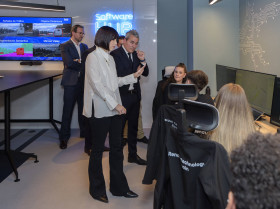
El hecho de que Renault Group cuente ya en el país con un importante Centro de I+D+i con mil ingenieros ha sido uno de los motivos que ha impulsado esta decisión,
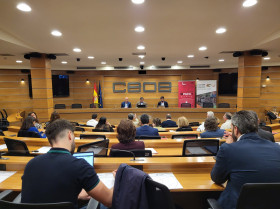
La organización del evento, del 7 al 10 de mayo en Fira de Barcelona, ha detallado el nuevo estudio en Barcelona y Madrid.
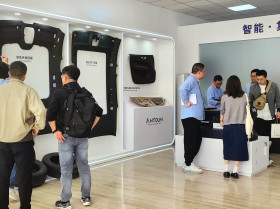
La multinacional española realiza un destacado displiegue en la muestra del 25 de abril al 4 de mayo.
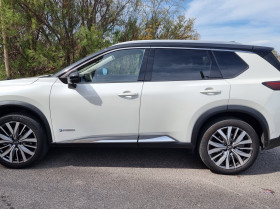
En el fascinante universo de los SUV, el Nissan X-trail emerge como un protagonista indiscutible, fusionando la versatilidad de un crossover con la robustez de un todoterreno. Esta cuarta generación del X-Trail, representa la evolución de un modelo emblemático, cimentado en años de innovación y excelencia. Texto y fotos: Eusebio Albert
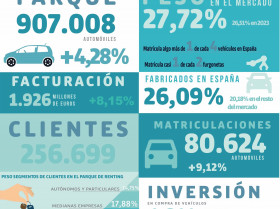
Las grandes empresas (con más de 24 vehículos) son las que más incrementan porcentualmente su parque en renting.
